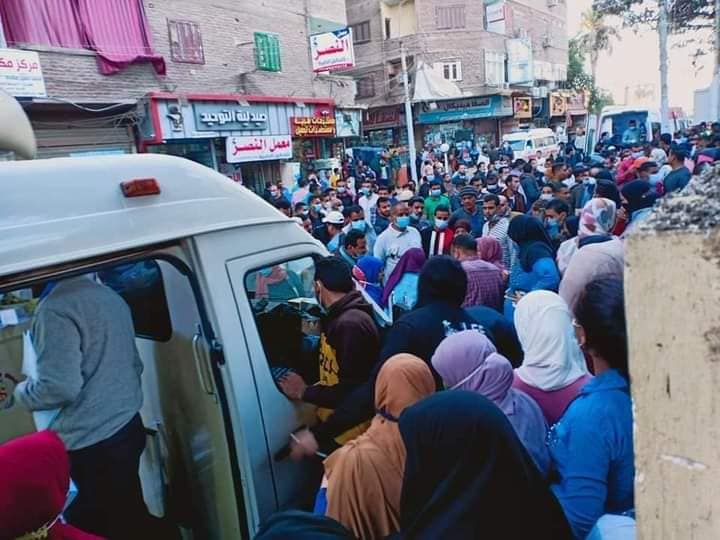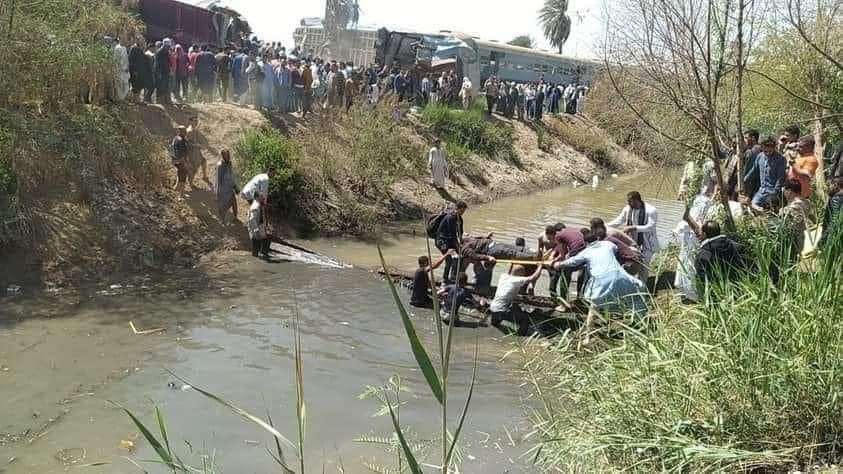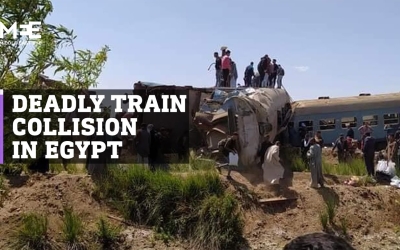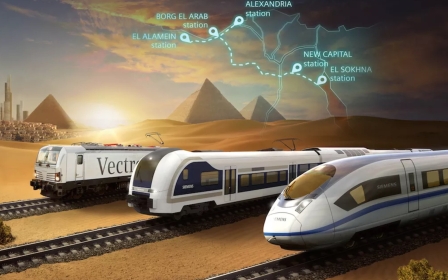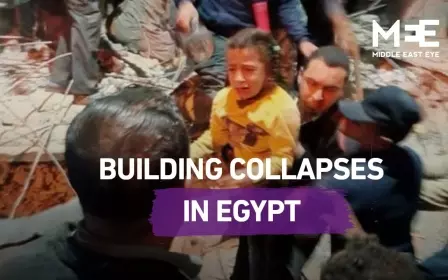Upper Egypt in agony as families mourn victims of train crash
Dozens of families from across impoverished Upper Egypt stood for hours in front of the Tahta General Hospital's morgue until Saturday morning as they waited to identify and receive the bodies of their loved ones killed in a train crash on Friday.
Sounds of screaming and wailing overwhelmed the scene, with some mourners collapsing as debris and bodies in body bags continued to enter the morgue a day after the tragedy occurred in the Tahta district of southern Sohag province.
The health ministry said on Saturday that 19 people were killed in the incident, in which two passenger trains collided, with 185 injured. This was down from an initial statement that said 32 people had been killed, with 165 injured.
Two-thirds of the Tahta General Hospital is already entirely occupied with coronavirus patients. The under-equipped hospital had to delegate some doctors in the quarantine department to help their colleagues in the emergency section.
New MEE newsletter: Jerusalem Dispatch
Sign up to get the latest insights and analysis on Israel-Palestine, alongside Turkey Unpacked and other MEE newsletters
The male family members of Hany Mohammed Salem, a retired low-ranking police officer from Sohag, waited for 10 hours to transfer his body to Koum Ashqaw in Sohag for burial.
"He was on his way to Sohag to visit his family back from his work in the Delta, and we didn't get the chance to bid him farewell," Mostafa Salem, his 31-year-old cousin, told Middle East Eye.
"We consider him a martyr who was earning a living to support his family."
Mostafa said that Hany's body was crushed under metal, and his facial features were rendered unrecognisable.
"We recognised him from the clothes and the identification cards," the cousin said.
"We do not want compensation from the government. We are a proud people and do not take money to compensate for the loss of our own.
"We only want those responsible to be held accountable. Not the poor conductor or driver, but the government and high-ranking officials."
The first statements released by the Egyptian government in response to the incident said prosecutors would "interrogate several rail employees, including the two train drivers, their assistants and the signalman," AFP reported.
However, media reports on Saturday claimed both train drivers had died of injuries sustained in the crash.
Carrriage 5
As the screaming continued outside the hospital, a green Peugeot 504 seven-seater with Luxor plates, a popular vehicle in upper Egypt, arrived directly from Luxor city.
The family of Ezzeddine Abu al-Wafa, a 59-year-old employee from Luxor, read his name on a Facebook post that listed the names of those wounded in the train crash.
After finding him in a stable condition with some broken bones and bruises, his brother Awad told MEE that there was no cooperation from the government to help the families find their relatives.
"We drove to Akhmim hospital [5 km from Tahta] and did not find [the victims]. Later on, a younger family member saw his name and we headed there," he said.
Awad said that his brother comes from a poor family and was on his way to work.
Occupants of the two trains that crashed were mainly families and individuals from Upper Egypt who were either running errands, going home for the weekend, or police and army conscripts taking a monthly leave.
Emad Omar, one of the people who survived the crash, lives in Naga Hamadi in the Qena governorate.
He was travelling along with his brother to Cairo, where they work. Accompanying them was their cousin who had an exam also in the capital. The three took the 2011 special train that started in Aswan and should have ended in Cairo.
Luckily, they had managed to get seats in carriage five, where the impact of the crash was much less severe than it was on the first three carriages.
"We felt a massive blow that sent all passengers cramming on one another. But luckily no one died. An old lady was injured," Omar said.
"There was panic, and everyone wanted to leave the train. We had light luggage so we got out. We found a lot of bodies, injured people, and women stuck under the seats."
The three helped as many people as they could, and took a private car to return to their village.
Omar and his brother are machinists in a factory for car parts in Cairo. They helped locals to put together makeshift floating bridges between the banks of a small waterway in order to transfer the injured to the other side because the nearest bridge was too far.
'We are just numbers'
Salama Shebeen, a nurse teaching assistant who was riding the same train on her way to Alexandria University, told MEE that she had survived by luck as the impact had thrown her off on some bags and she did not sustain any injuries.
"I got out and I found a lot of people screaming and people still stuck under the debris," the 26-year-old nurse said.
'The price of people's [lives] in Upper Egypt is so cheap. We are just numbers, and we are not important'
- Salama Shebeen, survivor
"Everyone did what they could. There were female nurses on board and conscripts who were medics who helped until the ambulances arrived.
"All I can say is that I could have died today. The price of people's [lives] in Upper Egypt is so cheap. We are just numbers, and we are not important," Shebeen said, pointing to the marginalisation and lack of infrastructure and services in the impoverished and heavily populated reagion.
Ahmed Sedeeq, a 21-year-old conscript, lived in al-Manshaa village, not far from the Tahta hospital.
At 11 pm on Friday, hundreds of villagers held a prayer as the body of Sedeeq arrived at al-Ebtehal mosque.
"He was only one year away from finishing his military service and getting married," Sayed al-Shawarby, Sedeeq's neighbour, told MEE, as tension and crying rose with the arrival of the body to front of the mosque.
The impoverished Upper Egypt
Mahmoud al-Sayed was one of the first responders at the scene of the crash. He and dozens from al-Maragha village were preparing for Friday prayers at 11:30 am when the crash took place.
"We rescued more than 400 people from under the debris," Sayed, 46, told MEE. "The men and young people from all the nearby villages performed extreme rescue efforts and lifted carriages from over the stranded passengers."
Sayed said it took the first ambulance two-and-a-half hours to arrive.
'Most of those who died are poor people who cannot afford to ride the microbus or better trains. They prefer to be squeezed in a poor train because of their poverty'
- Ismail al-Oquba, eyewitness
"When the ambulances arrived, they were unprepared, not even with body bags. We collected body parts, legs, and hands," he said.
"The locals carried the injured through the water to help them reach the other side.
"Most of those who died are poor people who cannot afford to ride the microbus or better trains. They prefer to be squeezed in a poor train because of their poverty."
Ismail al-Oquba, another eyewitness who was present at the early stages of the rescue efforts, said that there were not enough ambulances and some people had to hire private funeral service cars to carry the bodies.
"Last month, Transport Minister Kamel al-Wazir was in Upper Egypt and promised citizens in Assiut, Sohag, and Luxor that older trains would be taken out of service and replaced with new ones," Oquba said.
"But of course, we know that is a lie. These are the same trains we have been seeing and riding since the day we were born."
A sense of solidarity
Amid lack of government welfare and support to the injured and their families, the sense of solidarity among Upper Egypt citizens has shown the strength of a community that is often criticised by popular culture of being uneducated and backward.
An hour after the incident, large numbers of messages were circulated on social media for healthy adults to head to the nearest public hospitals or clinics to donate blood of all types.
As hospital entrances started to be crowded, young people roamed the crowd distributing masks, sanitisers, water bottles, while other volunteers began preparing and buying meals for families who would stay the night.
"These are our people who will have to stay the night, and this is the least we can offer to them," said Fouad Abdel-Dayem, one of those distributing meals.
Abdel Dayem, a law student at the University of Sohag, and his friends have also organised themselves on Facebook to prepare free accommodation for families who are waiting for their injured relatives to be discharged, or families waiting to receive the bodies of their relatives.
"If we wait for the government, we will wait for a long time. We are in this together, and we have to compensate for the government's failures," Dayem said.
Outside Sohag University Hospital, dozens of young men and women gathered to donate blood and organise relief trips to support the affected families.
"We managed to collect 600 blood donations in four hours, and we expect more to come," said Hafsa al-Awady, a medical student from Sohag University.
"We have also organised a fund to collect money to finance any missing medical tools, and we made the hospital's head surgeon responsible for it."
Middle East Eye delivers independent and unrivalled coverage and analysis of the Middle East, North Africa and beyond. To learn more about republishing this content and the associated fees, please fill out this form. More about MEE can be found here.


